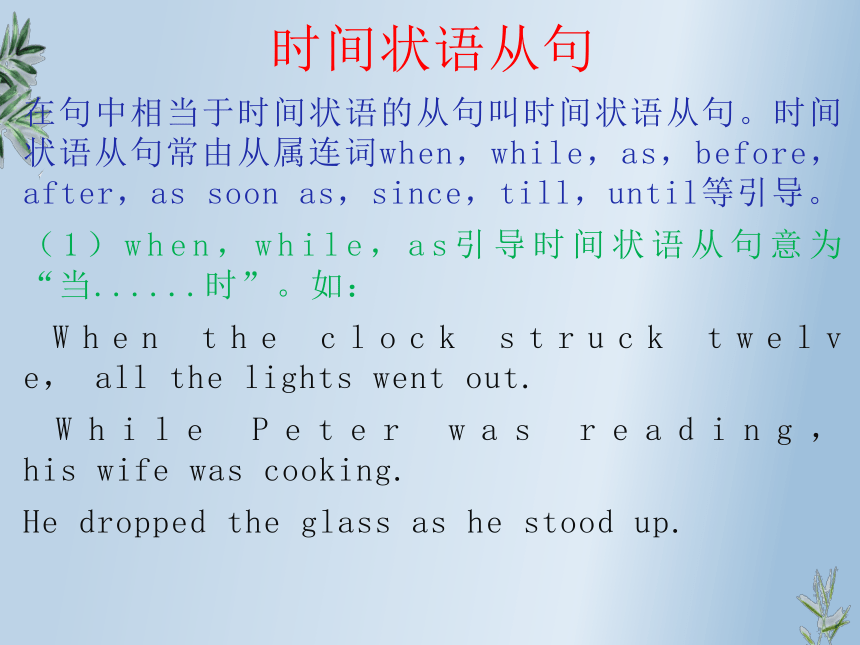初中全新英语语法——状语从句(共19张PPT)
文档属性
| 名称 | 初中全新英语语法——状语从句(共19张PPT) |  | |
| 格式 | ppt | ||
| 文件大小 | 2.1MB | ||
| 资源类型 | 教案 | ||
| 版本资源 | 通用版 | ||
| 科目 | 英语 | ||
| 更新时间 | 2022-04-10 18:36:03 | ||
图片预览







文档简介
(共19张PPT)
初中全新英语语法
状语从句
用一个句子作状语,这个句子就是状语从句。状语从句通常用来修饰句子、动词或形容词,表示时间、地点、条件、原因、目的、结果、方式、比较等。引导状语从句的连词叫从属连词。
时间状语从句
在句中相当于时间状语的从句叫时间状语从句。时间状语从句常由从属连词when,while,as,before,after,as soon as,since,till,until等引导。
(1)when,while,as引导时间状语从句意为“当......时”。如:
When the clock struck twelve, all the lights went out.
While Peter was reading,his wife was cooking.
He dropped the glass as he stood up.
(2)before引导时间状语意为“在......之前”。如:
Don't jump off the train before it stops. Look at both ways before you cross the road.I didn't know any English before I came here.
(3)after引导时间状语从句意为“....之后”。如:
I'll have a walk after I finish my work.
After he locked the door, he left.
(4) until,till引导时间状语从句意为“直到......为止”。如:
They waited till/until I returned.
Mr. Wang kept on explaining until the student understood.
(5) since引导时间状语从句意为“自......以来”
Since I left school, I have written to him twice. I have not heard from him since he left Shanghai.
(6)as soon as引导时间状语从句意为“一.......就.......”
I'll tell you as soon as I get here.
I want to see him as soon as he arrives.
地点状语从句
1. where引导地点状语从句
where引导地点状语从句表示“......的地方”。
We live where the road crosses the river.
2.wherever引导地点状语从句
wherever引导地点状语从句意为“在......的任何(所自)地方”。如:
You can sit wherever you like.
You can put the book where you like.
条件状语从句
(1)if引导条件状语从句
if引导条件状语从句意为如果”,表示一种假设的条件。如:
You can leave now if you like.如果你愿意现在就可以走了。
If you study hard, you will pass the final examination.
(2) unless引导条件状语从句
unless引导条件状语从句意为“除非;如果不...”相当于if ... not,而且可以与if引导的条件状语从句互换使用。如:
I will go there tomorrow unless it rains.
=I will go there tomorrow if it doesn't rain.
(3) so/as long as引导条件状语从句
so long as或as long as引导条件状语从句意为“只......如:
So/As long as you promise to go, I'll surely go.
原因状语从句
(1) because意为“因为”,与as, for, since相比语气最强,主从句间有直接的因果关系,它所指的原因通常是听话人所不知道的;从句一般放在主句的后面,也可放在主句前面或单独存在;在回答why的问句时,只用because。 如:
He is absent, because he is ill.(“生病”是“缺席”的必然原因)
The swimming pool won't be open today because they're making repairs.
— Why did you move to France
—Because my father found work in Paris.
(2)as意为“因为;由于”,语气比because, since弱,含义与since相同,但没有since正式;所引导的原因状语从句表示不言而喻、为人所知、显而易见的原因和理由,或者理由不是 很重要;as引导的从句通常位于主句的前面;从句说明原因,主句说明结果,主从并重。如:
As I had a cold,I was absent from school. As I have time today, I want to visit my grandparents.
(3)since意为“由于 、既然”,侧重主句,since引起的从句表示显然的或已为人所知的、无需加以说明的原因或事实的理由;通常置于句首,表示一种含有勉强语气的原因;语气比because弱,但是比as强。如:
since we have no money, we can't buy that vase.
Since everybody is here,let's begin our party.
目的状语从句
(1)so that引目的状语从何意为“以便;为了”,通常放在主句之后,从句中一般含有can,could,may,might,will,would等情态动词。如:I left at 6:00 so that I could catch the train.
She dresses like that so that everyone will catch her.
(2)in order that引导目的状语从句意为“为了”,所引导的目的状语从句既可以放在主句前,也可以放在可以放在主句后。如:
The teacher spoke very slowly in order that we could follow her.
In order that we should understand each other better, we got together and talked the matter over face to face.
结果状语从句
(1)so...that ...引导结果状语从向意为“如此......以至于......”。如:
I was so hot that we wanted to go swimming.
It was so dark that he couldn't see the facts of others.天气
(2)such...that...引导结果状语从句意为“如此......以至于......”。如:
They are such wonderful players that no one can beat them.
She is such a good teacher that all the students like her.
让步状语从句
(1) although和though引导让步状语从句同义,意为“虽然;尽管”;although和though引导的让步状语从句大都放在主句前但也可以放在主句后。如:
Although/ Though they are poor, they are happy.
Though he is very old, he works hard.
(2)even if,even though引导让步状语从句意为“即使”,多数情况下二者也可通用。如:
I'll go even if/though it snows.
Even though/if you say so,I do not believe it.
方式状语从句
as引导方式状语从句意为“按照;像......”;as引导的方式状语从句通常位于主句后,但在(just) as...so...结构中位于句首,这时as从句带有比喻的含义。意思是“正如......;就像”,多用于正式文体。如:
You should do as I told you.
You must try to hold the tool as I do.
Just as we sweep our rooms,so we should sweep backward ideas from our minds.
比较状语从句
(1)as... as...引导比较状语从句意为“和......一样",as... as中间用形容词或副词原级,后一个as后的谓语动词常常省略。如:
Henry is as good as Peter (is).
Jack is as tall as Bob (is).
(3) than引导比较状语从句意为“比...."常用于比较级句型,than前用形容词或副词的比较级形式。如:
You look younger than you are.
This book is more instructive than that one.
初中全新英语语法
状语从句
用一个句子作状语,这个句子就是状语从句。状语从句通常用来修饰句子、动词或形容词,表示时间、地点、条件、原因、目的、结果、方式、比较等。引导状语从句的连词叫从属连词。
时间状语从句
在句中相当于时间状语的从句叫时间状语从句。时间状语从句常由从属连词when,while,as,before,after,as soon as,since,till,until等引导。
(1)when,while,as引导时间状语从句意为“当......时”。如:
When the clock struck twelve, all the lights went out.
While Peter was reading,his wife was cooking.
He dropped the glass as he stood up.
(2)before引导时间状语意为“在......之前”。如:
Don't jump off the train before it stops. Look at both ways before you cross the road.I didn't know any English before I came here.
(3)after引导时间状语从句意为“....之后”。如:
I'll have a walk after I finish my work.
After he locked the door, he left.
(4) until,till引导时间状语从句意为“直到......为止”。如:
They waited till/until I returned.
Mr. Wang kept on explaining until the student understood.
(5) since引导时间状语从句意为“自......以来”
Since I left school, I have written to him twice. I have not heard from him since he left Shanghai.
(6)as soon as引导时间状语从句意为“一.......就.......”
I'll tell you as soon as I get here.
I want to see him as soon as he arrives.
地点状语从句
1. where引导地点状语从句
where引导地点状语从句表示“......的地方”。
We live where the road crosses the river.
2.wherever引导地点状语从句
wherever引导地点状语从句意为“在......的任何(所自)地方”。如:
You can sit wherever you like.
You can put the book where you like.
条件状语从句
(1)if引导条件状语从句
if引导条件状语从句意为如果”,表示一种假设的条件。如:
You can leave now if you like.如果你愿意现在就可以走了。
If you study hard, you will pass the final examination.
(2) unless引导条件状语从句
unless引导条件状语从句意为“除非;如果不...”相当于if ... not,而且可以与if引导的条件状语从句互换使用。如:
I will go there tomorrow unless it rains.
=I will go there tomorrow if it doesn't rain.
(3) so/as long as引导条件状语从句
so long as或as long as引导条件状语从句意为“只......如:
So/As long as you promise to go, I'll surely go.
原因状语从句
(1) because意为“因为”,与as, for, since相比语气最强,主从句间有直接的因果关系,它所指的原因通常是听话人所不知道的;从句一般放在主句的后面,也可放在主句前面或单独存在;在回答why的问句时,只用because。 如:
He is absent, because he is ill.(“生病”是“缺席”的必然原因)
The swimming pool won't be open today because they're making repairs.
— Why did you move to France
—Because my father found work in Paris.
(2)as意为“因为;由于”,语气比because, since弱,含义与since相同,但没有since正式;所引导的原因状语从句表示不言而喻、为人所知、显而易见的原因和理由,或者理由不是 很重要;as引导的从句通常位于主句的前面;从句说明原因,主句说明结果,主从并重。如:
As I had a cold,I was absent from school. As I have time today, I want to visit my grandparents.
(3)since意为“由于 、既然”,侧重主句,since引起的从句表示显然的或已为人所知的、无需加以说明的原因或事实的理由;通常置于句首,表示一种含有勉强语气的原因;语气比because弱,但是比as强。如:
since we have no money, we can't buy that vase.
Since everybody is here,let's begin our party.
目的状语从句
(1)so that引目的状语从何意为“以便;为了”,通常放在主句之后,从句中一般含有can,could,may,might,will,would等情态动词。如:I left at 6:00 so that I could catch the train.
She dresses like that so that everyone will catch her.
(2)in order that引导目的状语从句意为“为了”,所引导的目的状语从句既可以放在主句前,也可以放在可以放在主句后。如:
The teacher spoke very slowly in order that we could follow her.
In order that we should understand each other better, we got together and talked the matter over face to face.
结果状语从句
(1)so...that ...引导结果状语从向意为“如此......以至于......”。如:
I was so hot that we wanted to go swimming.
It was so dark that he couldn't see the facts of others.天气
(2)such...that...引导结果状语从句意为“如此......以至于......”。如:
They are such wonderful players that no one can beat them.
She is such a good teacher that all the students like her.
让步状语从句
(1) although和though引导让步状语从句同义,意为“虽然;尽管”;although和though引导的让步状语从句大都放在主句前但也可以放在主句后。如:
Although/ Though they are poor, they are happy.
Though he is very old, he works hard.
(2)even if,even though引导让步状语从句意为“即使”,多数情况下二者也可通用。如:
I'll go even if/though it snows.
Even though/if you say so,I do not believe it.
方式状语从句
as引导方式状语从句意为“按照;像......”;as引导的方式状语从句通常位于主句后,但在(just) as...so...结构中位于句首,这时as从句带有比喻的含义。意思是“正如......;就像”,多用于正式文体。如:
You should do as I told you.
You must try to hold the tool as I do.
Just as we sweep our rooms,so we should sweep backward ideas from our minds.
比较状语从句
(1)as... as...引导比较状语从句意为“和......一样",as... as中间用形容词或副词原级,后一个as后的谓语动词常常省略。如:
Henry is as good as Peter (is).
Jack is as tall as Bob (is).
(3) than引导比较状语从句意为“比...."常用于比较级句型,than前用形容词或副词的比较级形式。如:
You look younger than you are.
This book is more instructive than that one.
同课章节目录
- 词法
- 名词
- 动词和动词短语
- 动词语态
- 动词时态
- 助动词和情态动词
- 非谓语动词
- 冠词
- 代词
- 数词和量词
- 形容词副词及其比较等级
- 介词和介词短语
- 连词和感叹词
- 构词法
- 相似、相近词比较
- 句法
- 陈述句
- 一般疑问句和否定疑问句
- 特殊疑问句及选择疑问句
- 反意疑问句
- 存在句(There be句型)
- 宾语从句
- 定语从句
- 状语从句
- 主谓一致问题
- 简单句
- 并列句
- 复合句
- 主谓一致
- 主、表语从句
- 名词性从句
- 直接引语和间接引语
- 虚拟语气
- 感叹句
- 强调句
- 倒装句
- 祈使句
- 句子的成分
- 句子的分类
- 题型专区
- 单项选择部分
- 易错题
- 完形填空
- 阅读理解
- 词汇练习
- 听说训练
- 句型转换
- 补全对话
- 短文改错
- 翻译
- 书面表达
- 任务型阅读
- 语法填空
- 其他资料
